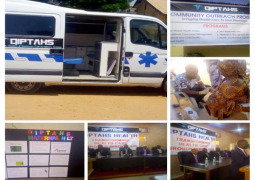The United Nations World Food Programme (WFP), in collaboration with the Ministry of Basic and Secondary Education have just concluded a countrywide 18-day training of cooks, cluster monitors, head teachers and representatives from the Learner Welfare and School Environment Committees.
The training took place from 11 - 29 May 2009 in selected WFP-assisted schools countrywide, targeting 340 Lower Basic and Basic Cycle schools, including Madrassas from Region two to six.
To expand its partnership base, WFP had invited other agencies including UNICEF to participate in the preparations leading to the training. Resource persons and facilitators for the training were drawn from the National Nutrition Agency (NaNA), Ministry of Health and Social Welfare and the Ministry of Basic and Secondary Education, both at the Central and Regional levels, to ensure continuity, coherence and cohesiveness.
The objective of the training was to enhance and develop the knowledge and skills of the participants on food and nutrition, including cooking demonstrations, health, hygiene and environmental sanitation practices, geared towards the provision of nutritionally balanced and bacteria-free meals for school children.
Research has shown that the nutrition and health status are powerful influences on children's learning and how well they perform in school. Children who lack certain nutrients in their diet and who suffer from hunger, malnutrition and disease do not have the same potential for learning as healthy and well-nourished children.
To break the monotony of the meals being prepared at the school level, a Recipe Book ('The School Feeding Recipe Book") with varied recipes was developed by WFP and used during the cooking demonstrations to improve the skills of the cooks. School heads and cooks were encouraged to use produce from the school garden, the maximum use of which will not only add the much needed nutrients but will enhance the flavour, improve the colour and palatability of the dishes.
A total of 657 people were trained - 328 cooks, 282 from the Learner Welfare Committees, 11 Head teachers, 4 deputies, 3 senior teachers and 29 Cluster monitors.
This training was part of a series of capacity building initiatives, aimed at enhancing the capacity of stakeholders for effective management of the Food for Education Programme. Other initiatives include, promotion of school gardens, dc-worming of school children and training of Food Management Committees, among others.
As the largest provider of nutritious meals to the vulnerable school children, WFP has launched a global campaign, aimed at ensuring that the world's 300 million undernourished children are educated.



